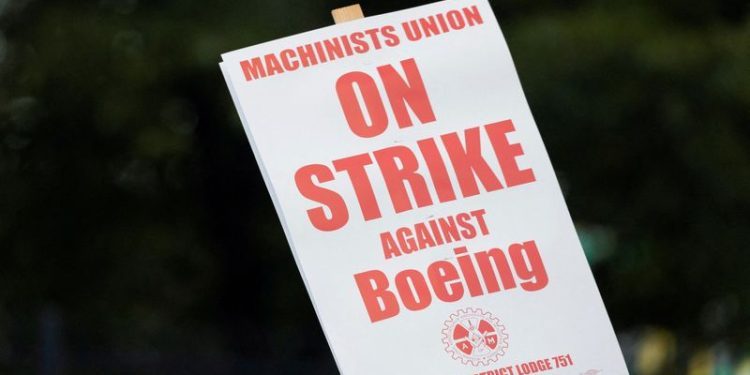SEATTLE (Reuters) – A strike at Boeing (NYSE:BA) “could go on for a while” as workers are confident they can get bigger wage increases and an improved pension, union leader Jon Holden said in an interview with National Public Radio (NPR) on Saturday.
More than 30,000 members of the International Association of Machinists and Aerospace Workers (IAM), who produce Boeing’s top-selling 737 MAX and other jets in the Seattle and Portland, began a strike on Friday after overwhelmingly voting down a new contract.
Boeing and union negotiators are due to return to the bargaining table next week, in talks overseen by U.S. federal mediators, after more than 94% of workers voted to reject an initial contract offer that Holden had endorsed.
Holden said the priorities for his members were a bigger wage increase and the restoration of a defined-benefit pension scheme that the IAM lost during a previous round of negotiations with Boeing a decade ago.
“We have the most leverage and the most power at the most opportune time that we’ve ever had in our history, and our members are expecting us to use it,” Holden told NPR.
“I know that our members are confident. They’re standing shoulder to shoulder and they’re ready. So it (the strike) could go on for a while.”
The initial deal included a 25% pay rise spread over four years and a commitment by Boeing to build its next commercial jet in the Seattle region, if the plane program was launched within the four-year period of the contract.
Union members, venting frustration at years of stagnant wages and rising living costs, said removal of a performance bonus in the Boeing offer would erode half of the headline salary increase.
Boeing’s stock fell 3.7% on Friday. It has tumbled almost 40% so far this year, slashing the company’s market value by roughly $58 billion
A long strike could further damage Boeing’s finances, already groaning due to a $60 billion debt pile. A lengthy pause on plane production would also weigh on airlines that fly Boeing jets and suppliers that manufacture parts.





